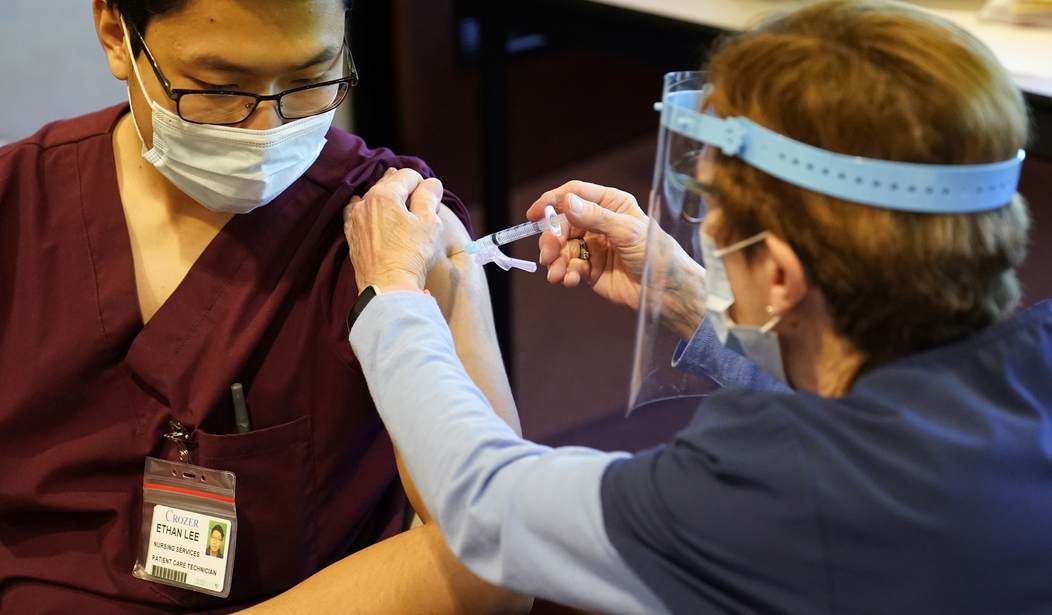This was the main topic at this morning’s White House COVID briefing, keying off a recent Times story about how some Americans have chosen to skip their second dose of Pfizer or Moderna. The good news is that 92 percent have gotten both shots, an exceptionally high rate of follow-through relative to other two-dose vaccines in the past. The bad news is that more than five million people have chosen not to keep their second appointment. Some are anxious about the side effects, which tend to be worse after the second shot; some think one shot is “enough”; some just can’t get it together or navigate the scheduling system. (Some have even found that their pharmacy ran out of doses before their second shot.)
Whatever the excuse, it’s important to get both.
Dr. Fauci presenting compelling data that we really need 2 doses of Pfizer & Moderna vaccines.
1 dose is much less effective, and we don't know how long that one-dose protection will last.
Those who haven't gotten their 2nd dose for whatever reason should get it ASAP. pic.twitter.com/mBCl0jU8ik
— Leana Wen, M.D. (@DrLeanaWen) April 30, 2021
Another slide from the same presentation:

D614G is one of the mutations in India’s “double mutant” variant. B.1.1.7 is the British variant. B.1.351 is the South African variant, which has been a bit more resistant to vaccine immunity than other strains. The data is clear: With one dose you have only mild protection from the first two mutations and basically none from the third. With two doses, you have lots. Yet another slide found that two doses were 94 percent effective in senior citizens against COVID severe enough to require hospitalization. By comparison, a single dose for the same group was just 64 percent effective.
The fact that two doses of an mRNA vaccine are needed before someone is fully vaccinated is one of the most well-known facts about those products. Yet you’d be surprised how many Americans didn’t get the memo:
Researchers from Cornell University and Boston Children’s Hospital surveyed a representative sample of more than 1,000 Americans in February, and found that 20 percent believed they were strongly protected after just one dose of a two-dose vaccine. (Another 36 percent said they weren’t sure how protected they were.) And among those respondents who had already received at least one shot, 15 percent didn’t remember being told to come back for a second dose. About half didn’t remember anyone telling them that protection was strongest after the second dose, according to the report, published in The New England Journal of Medicine.
One expert told the Times that antibody levels are about 10 times greater following the second dose than they are after the first. And “the second dose induces cellular immunity, which predicts not only longer protection, but better protection against variant strains.” That’s what the feds are really worried about, per the second slide above: Variants. Pfizer and Moderna provide plenty of protection after a single dose against common COVID but introduce a variant and things get dodgy.
Even so, let’s look at the latest data from the UK. That’s where the so-called British variant first became prevalent, of course, and it’s also where the government has been following a “first doses first” strategy to try to build herd immunity as quickly as possible. Instead of focusing on fully vaccinating a smaller share of the population, the UK chose to create partial immunity in a larger share of the population by dispensing first doses to as many people as possible and worrying about second doses later. How has that worked out for them?

The seven-day average of daily cases has dropped to its lowest point in nearly eight months. Average daily deaths have declined from a peak of 1,250 per day this winter to 22 now. The wrinkle in pronouncing the UK’s vaccination strategy a smash success is that they’ve been handing out doses amid a protracted national lockdown. It’s not just the vaccines that are driving down cases, in other words, it’s the extreme social distancing mandated for Britons. Now that the lockdown has lifted, maybe their cases will begin to tick up again due to the fact that most Brits have only partial immunity right now. That’s what we’d expect from the White House data today, certainly.
But it’s possible that the partial protection created by so many people having received the first dose was enough to produce a stronger degree of herd immunity within the UK than we have here. Each individual Brit who’s had only one shot is at greater risk than an individual American who’s had two, but the widespread partial immunity generated by the “first doses first” strategy may have closed off more vectors of transmission for the virus over there than we’ve done here. Result: Fewer cases per capita even though the average vaccinated American is better protected than the average vaccinated Brit is.
As for the country that’s set the pace globally by fully vaccinating a greater share of their population than any other, they’re down to 86 cases on average per day:

Israel peaked at nearly 8,400 cases daily this winter. They’re looking at a 99 percent reduction or thereabouts, in other words. Their average daily death toll now is … three. Nationwide. The per-capita equivalent in the U.S. would be around 100. Get both shots and we can get there.








Join the conversation as a VIP Member